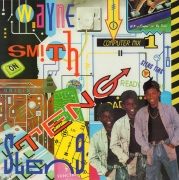|
barkbell posted:I think I'll do the interview just for some interview practice but tell the recruiter I'm not interested afterwards. Remote work (and remote work during COVID) is a filter on Indeed but otherwise I think it's a crapshoot, so if anybody knows better I would also be interested.
|
|
|
|

|
| # ? Apr 20, 2024 05:13 |
|
barkbell posted:I think I'll do the interview just for some interview practice but tell the recruiter I'm not interested afterwards. So this is a very good idea. I would suggest also attempting to negotiate whatever number you think would be into the territory of "I want to do this", even if you know they'll say no. Negotiating is a skill too. So getting practice saying "Yeah I'll do this job if you double the pay" is still worthwhile. You'll learn someone rejecting your negotiation is not a bad thing.
|
|
|
|
barkbell posted:I think I'll do the interview just for some interview practice but tell the recruiter I'm not interested afterwards. Interviewing for practice in selling yourself, getting offers and negotiating is a great idea. BTW Typescript isn't a functional language. F# is, if you want to get into functional programming on the .NET stack. I point this out because if you say "I like functional programming, Typescript is great!" in an interview, they are going to assume you don't know what you're talking about.
|
|
|
|
Maybe I'm misunderstanding but does TS not include a lot of functional stuff?
|
|
|
|
It definitely does, but it also inherits lots of mutable state from JS. It's a functional language in the sense that functions are first-class, but it doesn't exactly promote strict scoping or immutability. On the other hand, there's plenty of gross stateful Lisp code floating around, too.
|
|
|
|
Typescript has more functional ideas than Javascript but less than F#/OCaml/Haskell/etc. It'd be better to talk about how functional a language is rather than whether it's functional or not, but for now, when people talk about functional languages, they're referring to things that are very close to Haskell or an ML dialect.
|
|
|
|
So I've enrolled in a bootcamp. I'm going to leave the horrible restaurant industry behind and become a full stack Java dev I guess, I'm not 100% sure what that is exactly. Is there a non full stack version of this? (a half stack?) What's an entry level job in this look like as far as day to day? I have almost no idea what having a 9-5 even looks like, let alone one in a field I have zero experience in. I've come to terms with that fact that I'm no longer free to tell my coworkers that their giant rear end is in my way and that I hosed their mother the night before, but other than that, what should I expect? Am I likely to be assigned someone as a kind of mentor to bring me up to speed with whatever they're doing? Do they just throw you in and yell at you to code the thing? I'm sure it depends on the company but what's a general day to day like based on your experiences?
|
|
|
|
Guildenstern Mother posted:So I've enrolled in a bootcamp. I'm going to leave the horrible restaurant industry behind and become a full stack Java dev I guess, I'm not 100% sure what that is exactly. Is there a non full stack version of this? (a half stack?) What's an entry level job in this look like as far as day to day? I have almost no idea what having a 9-5 even looks like, let alone one in a field I have zero experience in. I've come to terms with that fact that I'm no longer free to tell my coworkers that their giant rear end is in my way and that I hosed their mother the night before, but other than that, what should I expect? Am I likely to be assigned someone as a kind of mentor to bring me up to speed with whatever they're doing? Do they just throw you in and yell at you to code the thing? I'm sure it depends on the company but what's a general day to day like based on your experiences? Full stack is a term in web development that means "work on both client or server" - e.g. willing to do both the javascript front end and develop backend apis as well. Day to day is going to involve some combination of going to stand up meetings where everyone goes through what they're working on real fast, getting assigned tickets to work through bugs, and getting assigned user stories and other tasks for new feature implementation. Most of your day is going to involve staring at code in a debugger wondering why it isn't working, trying to figure out the real problem under what people are actually complaining about, and occasionally actually writing new code that will seem like a good idea at the time. Workplace etiquette varies based on company, but in general the norms are pretty similar for any white color job, and they'll be probably be pretty extensively documented in some really long powerpoint presentations. Don't expect a lot in terms of mentorship or training - you will likely have a team lead, and that dude will probably answer specific questions about how to, say, get source control set up, and there's likely going to be a code review process and all that which you will be expected to use before checking stuff in, but don't expect orientation sessions or "teach you how to program" sessions or explanation of the architecture or what the product you're working on even does - autodidactism goes a long way in this career. Bruegels Fuckbooks fucked around with this message at 14:38 on Jun 19, 2020 |
|
|
|
Guildenstern Mother posted:What's an entry level job in this look like as far as day to day? Currently I'm on WFH full time due to covid-19. I wake up at 6:30, make coffee, hop on my laptop, and start coding and code reviewing. I have standup mid-morning then code more or sometimes do some pair programming. Over lunch I go to the driving range or go for a bike ride. I come back, shower, cook lunch, and start tackling code reviews or getting things prepared for the next day. I'm usually done by about 3. It's a cushy gig right now. I think when the boss says time to come back into the office I'll say no. My last job was basically doing nothing for a week, so I would work on internal tools for the team or do reading and research. Then getting a project and having 3 weeks to turn around on it then back to doing nothing for a week. barkbell fucked around with this message at 14:18 on Jun 19, 2020 |
|
|
|
I's going to give you some different advice. I hire a significant number of people who are fresh to software dev, and in fact this year I hired a great guy who had a decade of restaurant/bar experience before switching careers. -You should really do pre-work before the bootcamp starts. I usually tell people to take time and build some stuff in Python or Javascript. Getting basic syntax and finding out if you hate building simple code would be a really good thing to know. Good bootcamps will probably have a pretty sizeable washout rate, coding is not for everybody. -Take the bootcamp seriously. I have interviewed people who passed through even good bootcamps and it is painfully obvious they copied off their friend or otherwise just passed it without learning anything. This is not valuable for you to do. You'll end up in some lovely IT Helpdesk job where you'll miss your restaurant gig. You will not be able to fake your way into a good software dev role. -If you like the technology but struggle with the coding (but still take the bootcamp seriously and get through) I'd seriously consider some of the adjacent jobs like QA or (more technical) Support roles. You may get disagreement from this thread, but those jobs can pay well, are not going to grind you down like serving will, and you can make a great career out of them. You will be disappointed with it if you love coding (hence the disagreement from this thread) but they can be good fits for people with skills that don't quite fit for software development. -All that said, if there are things about the bootcamp you hate, don't sweat it too much. They'll probably through a ton of stuff at you as it's full stack. Not everyone needs to love UI building, some people think API development is a giant bore. That's ok, you can specialize reasonably early in your career. Ask for help if you need it. Ask questions here and with anyone you know in the industry. Congrats on taking a leap!
|
|
|
|
As a bootcamp survivor I would strongly recommend trying to get all your poo poo in a row ahead of time with regards to personal schedule, dietary habits, mental health, social support networks, etc because if it's any good it is likely to be really loving hard unless you're just a natural, and your life outside of class can easily go to poo poo if you're unprepared Also if they have a CS segment, take it seriously even if it feels like it doesn't have anything to do with making poo poo
|
|
|
|
|
Lockback posted:
I'm going to be explicit about something here, and I'm not trying to discourage you or be overly negative, so please don't take it that way: If you signed up for a bootcamp without first doing a little bit of legwork to determine if it's a valid career path for you, then you've made a huge mistake. Software development is a skilled trade that takes a lifetime to master and requires continual learning to stay relevant; paying a bunch of money to find out that you hate doing it and have no aptitude or desire to do it for the next 20/30/50 years would be bad. I've met people who started to learn to program because they thought they'd like it or could parlay it into a career down the line, then stopped with reasons along the lines of "I found it to be repetitive and frustrating, I hated staring at a screen of code trying to find [syntax] errors".
|
|
|
|
TheIncredulousHulk posted:Also if they have a CS segment, take it seriously even if it feels like it doesn't have anything to do with making poo poo I've heard from a few places that a background in computer science doesn't matter that much when you're starting out, but about five years in it starts to make a difference. I find that plausible, and I'd urge people just starting out to consider that point of view.
|
|
|
|
It does. When technology changes youíll have a stable mental platform to stand on. (Thatís a weird metaphor, but gently caress it.)
|
|
|
|
lifg posted:It does. When technology changes youíll have a stable mental platform to stand on. I dunno man, I have known alot of developers and not a single one of them would I describe as mentally stable.
|
|
|
|
lifg posted:It does. When technology changes youíll have a stable mental platform to stand on. I was just talking something similar with people last weekend. The act of writing software isn't fundamentally very difficult. It mostly boils down to syntax and basic logical conditions. It's why a lot of novices can easily get through "hello world" and simple, toy applications, but then the entire "ecosystem" around programming kicks in and they get overwhelmed. Let's say you want to write a web application. Okay, in addition to the simple logic parts, and completely putting aside HTML/CSS, you need to start understanding: - The distinction between "front end" and "back end" ("why can't I call a javascript function in my webpage from my server API?" is a surprisingly common question) - HTTP -- how HTTP "works" (requests, responses, HTTPS, which quickly leads into the world of certificates and cryptography) - What a web server is, how a web server processes requests - Server platforms / hosting options. Cloud vs on prem vs whatever. Cloud platform differences, options, what options exist and why you should choose them, etc - Operating systems. MacOS vs Windows vs Linux vs whatever, how these things work, how to use them at a level than as an end-user - General computing hardware knowledge (CPU, disk, memory, how these things relate -- what is paging? Why do I care about it?) And for each programming-adjacent thing (databases, containers, whatever), tack on another set of deeper, fundamental prerequisite knowledge. Basically, people who have been immersed in technology practically since birth take a lot of this stuff for granted, so learning to program is easy because we can focus on the core programming concepts. Someone who's coming in with limited intimate knowledge of technology has a ton of seemingly impenetrable stuff that they need to learn, and trying to grasp one concept requires having grasped three other, even lower-level concepts. There are certainly cut-off points where you can kind of hand-wave away something and say "...for our purposes right now, this is magic". But you ultimately need to come back to the magic and understand it at some point.
|
|
|
|
New Yorp New Yorp posted:The act of writing software isn't fundamentally very difficult. Hard disagree. Writing a piece of code is easy (which I think is what you actually meant), but writing software is in general one of the hardest things that people attempt to do. Part of it is the domain complexity, but part of it is just inherent to making all the pieces fit together. You can't abstract that second part away.
|
|
|
|
ultrafilter posted:Hard disagree. Writing a piece of code is easy (which I think is what you actually meant), but writing software is in general one of the hardest things that people attempt to do. Part of it is the domain complexity, but part of it is just inherent to making all the pieces fit together. You can't abstract that second part away. Yeah, that's a fair semantic quibble. The act of writing code isn't hard. The act of writing software is hard for all of the reasons I outlined. The act of writing good software is a herculean feat.
|
|
|
|
Bruegels Fuckbooks posted:Don't expect a lot in terms of mentorship or training - you will likely have a team lead, and that dude will probably answer specific questions about how to, say, get source control set up, and there's likely going to be a code review process and all that which you will be expected to use before checking stuff in, but don't expect orientation sessions or "teach you how to program" sessions or explanation of the architecture or what the product you're working on even does - autodidactism goes a long way in this career. This can be true of some places, but I've generally always found there are people who you can seek mentorship from, sometimes it takes being proactive about it. I'm a very gregarious person though so that's my own personal experience. Being self directed is a good thing. You should try and seek out a place that will offer guidance to juniors, and those good places do exist. The YOSPOS list of interview questions is very good to have handy for getting out those kinds of details. Also, as another bootcamp person who is thriving in this career, hustling and networking is important. The first job is hard to get ime, you have to prove a lot more and interviewing is very different in this field. Once you get in and get a bit of experience, it's far less stressful. So you need to hustle to get your resume in hands, and be prepared for a lot of nos. And for networking, I mean cultivating actual relationships and not just linkedin contacts. It helps you in the future to know if this company offering you a team lead position is full of poo poo (because you know Janet who worked there) or if it's as rad as the Glassdoor reviews make it sound.
|
|
|
|
The one thing I feel bootcamp people need to know but are never told is that you can expect less than a 1% return on applications you send out. For every one hundred apps you send you might get one response. You might get lucky, but this was the case for everyone except two people in my bootcamp cohort, and both of them had CS degrees. The stress and feeling of hopelessness is common and extremely tough and if you're not prepared to deal with that, bounce.
|
|
|
|
Hadlock posted:£20k seems awfully low though, I was making that working part time scooping popcorn, it certainly can't hurt. £20k seems like what you'd get as an ex-convict in a work-release program. I don't know why the UK pays total shite for tech workers. My very first programming job out of uni, not in London, I made 18k - in 1998. 20k isnt just 'UK pays badly', it's actually ridiculously low.
|
|
|
|
Vincent Valentine posted:The one thing I feel bootcamp people need to know but are never told is that you can expect less than a 1% return on applications you send out. For every one hundred apps you send you might get one response. You might get lucky, but this was the case for everyone except two people in my bootcamp cohort, and both of them had CS degrees. This was the case for me and my wife back in 2016. I can only image itís significantly harder today. Thatís not meant to inspire hopelessness. I just agree with the above that in order to land that first job youíll need a great deal of persistence and tough skin. There will be a lot of rejection and you canít take it personally. But it gets a lot easier after that first job.
|
|
|
|
This might not be the right thread to ask but everyone is friendly here, so: is there any particular criteria for how algorithm sites classify problem difficulty? It's just odd running into Easy problems with ~40% success rates and Mediums with ~70% and I'm never quite sure what to make of it
|
|
|
|
|
TheIncredulousHulk posted:This might not be the right thread to ask but everyone is friendly here, so: is there any particular criteria for how algorithm sites classify problem difficulty? quote:It's just odd running into Easy problems with ~40% success rates and Mediums with ~70% and I'm never quite sure what to make of it
|
|
|
|
dirby posted:I don't know the answer to this, but... That's my assumption. When I actually do get in the Strange Mood required to want to do those problems I don't even look at the easy ones because they're usually just boring.
|
|
|
|
I'm looking for some guidance on seeking CS and programmer jobs in the Biology/Chemistry/Environmental fields: something helping lab or field work, production, or research. I don't really know what keywords or titles to look for as my cs experience so far is with more stereotypical business-technical stuff. I'll have an undergrad in CS this December, currently interning with IBM doing full stack training but the big corporate world isn't really where I want to end up. I'd be happy at a smaller company, lower stress job for 60-90k. I'm in Colorado now, I'd prefer to go to Florida for the next few years but definitely open to almost anywhere. I enjoy moving to new places. goodness fucked around with this message at 18:15 on Jun 22, 2020 |
|
|
|
I hope this is an okay place to ask this question. Since it's about a comp sci job I thought this might be better than the BFC career path thread. Soon, I need to be able to answer the question "Where do you want to be in 5 years?" Beyond the normal discomfort of looking forward in such strange times, I have no idea how to grapple with this question anymore. For backstory, I returned to college 6 years ago for a BA in Computer Science and have been working for about 4 years as a C# developer. I've managed to accomplish the simple career goals I set out at the time: I survived school, got a job and held on to it long enough to prove I'm not a complete gently caress-up, and leveraged that into the next job. I don't really have a specialty; Everything I've done is basically whatever they need me to, which has mostly been back-end and bug squashing. I don't aspire to leadership or management, and much of what I find on web searches is "junior-mid-level-senior-director" path that we've all heard of. Does anyone have any insight on what one could ask themselves to help them find some deeper career direction? Or know a good resource?
|
|
|
|
Say anything that's honest and meaningful. Since you're not interested in management, do you want to learn any other tech skills? Deepen database knowledge? Get better at distributed services? Learn more tree structures (comedy option)? Make your own tiny startup? Try your hand at technical sales? Get a few open source projects out the door? Whatever it is, have some kind of story to explain your desires. Show them some hunger and an entrepreneurial mindset, whether or not you want your own business.
|
|
|
|
The reason I ask variations of that question is to understand what role the person wants to fit over time. It sounds like you have some good answers, you know some things you don't want to do, and it sounds like you want to stay technical. As far as "What are some things I should think about if I don't want to be a manager", there may be people who can answer that better than I can (who went the management route), but things like a software Architect, Principal Dev, doing more exploratory work (like in Data Science or AI), or doing more full-stack or w/e.
|
|
|
|
goodness posted:I'm looking for some guidance on seeking CS and programmer jobs in the Biology/Chemistry/Environmental fields: something helping lab or field work, production, or research. I don't really know what keywords or titles to look for as my cs experience so far is with more stereotypical business-technical stuff. Something that may be good for you to get a foot in the door could be state work, say a state environmental agency. This could be especially big in Florida if they have any state run marine ecology programs, not something I am familiar with, but I would imagine it exists.
|
|
|
|
Iíve always hated that question, and Iíve never asked it. Whatís the point? What answer could someone give that would push an interviewer to ďhireĒ or ďpassĒ? (Edit: the question ďwhere do you see yourself in five yearsĒ)
|
|
|
|
lifg posted:Iíve always hated that question, and Iíve never asked it. Whatís the point? What answer could someone give that would push an interviewer to ďhireĒ or ďpassĒ? I remember hearing that question a lot at shadier places when I was desperate for any job at all during the 2008 recession - I interviewed at places that turned out to be MLM places (here's a hint, if anyone sounds excited that you have a college degree, your interview is a sham.) In best possible scenario, it means the place you're interviewing is super corporate and your interviewer is not well-read - in the worst case, it's a scam and you're being interviewed by people who learned how to interview people from watching movies. Meanwhile, the interview where one of the developers threatened to strangle me with my tie because we don't wear those here turned into a 10 year gig.
|
|
|
|
Thanks for the suggestions so far. I suppose I should add that this is not for an interview to get a different job, but at the behest of my manager for this purposes.
|
|
|
Trying to help a non-goon friend of mine out with his resume. I'm in professional school so for the last few years I've only been doing CVs. I've always been taught to make my CV boring; just plain black and white with maybe a different font for my name to make that stand out. My friend has apparently not been having much luck with his plain looking resume and has been trying to give it some level of design. Is this normal when looking for a tech job, or is it likely other issues with his resume that were making it a pass? A pic of it is below. I've been trying to help him out with the content itself (for example, how pretty much everything in the "Projects" section could actually just be moved to bullet points under his job dedscriptions), but I'm lost on the design aspect.
|
|
|
|
|
There's a very good chance that your interviewers will only ever see a plain text version of your resume. The design will either be lost, or it'll garble the actual content. Skip it.
|
|
|
|
Holy white space Batman
|
|
|
|
lifg posted:Iíve always hated that question, and Iíve never asked it. Whatís the point? What answer could someone give that would push an interviewer to ďhireĒ or ďpassĒ? I'd never ask that specific question, but it's trying to get at something important. You've probably heard something like "five years of experience is valuable, but a lot of people have only one year of experience, repeated five times." Someone who has some idea about where they want to go in the future is a lot more likely to get value out of their experience, learn, and grow. Those people will likely do better work in the future. Questions about future career plans and aspirations can help identify them, because they'll have thought about it and can have a conversation. The answer that puts the candidate closer to "hire" is any kind of plan or vision for the future. For a junior candidate, it doesn't even matter what that looks like. The one that puts them closer to "pass" is "I don't know, the same thing I'm doing now, I guess." Anyone who asks the specific question "where do you want to be in five years" is doing cargo-cult interviewing. But, if you're interviewing, you should have answers for that kind of questions. Bruegels Fuckbooks posted:Meanwhile, the interview where one of the developers threatened to strangle me with my tie because we don't wear those here turned into a 10 year gig. Now that is a red flag. I'm glad it worked out for you, but if somebody doesn't tell you about their strict dress code and then makes a joking death threat, it's usually time to walk out of the interview.
|
|
|
|
Fenris13 posted:Something that may be good for you to get a foot in the door could be state work, say a state environmental agency. This could be especially big in Florida if they have any state run marine ecology programs, not something I am familiar with, but I would imagine it exists. Great idea, especially as I am interested in marine ecology 
|
|
|
|
i vomit kittens posted:Trying to help a non-goon friend of mine out with his resume. I'm in professional school so for the last few years I've only been doing CVs. I've always been taught to make my CV boring; just plain black and white with maybe a different font for my name to make that stand out. My friend has apparently not been having much luck with his plain looking resume and has been trying to give it some level of design. Is this normal when looking for a tech job, or is it likely other issues with his resume that were making it a pass? A pic of it is below. I've been trying to help him out with the content itself (for example, how pretty much everything in the "Projects" section could actually just be moved to bullet points under his job dedscriptions), but I'm lost on the design aspect. I suppose I can take a crack at this. Iím a designer by education and have read over dozens of resumes in the last few weeks for a couple open engineering positions at my company. Here are some things I noticed about it: - Very overdesigned, comes off as tryhard while also looking like a stock template - Very sparse on content. With fewer items in experience, he could afford to flesh out the descriptions a bit more. - Exact start and end dates on the jobs and even education. This is kinda anal retentive and Iíve literally never seen it before. Weirds me out ever so slightly. - Awkward organization of content. Iím actually a fan of the dual column layout (my own resume is dual column), but itís not well executed here. - Contact info is way at the bottom and not very visible. He wants the companies to call him, right? - Huge logos for the skills. Too cutesy/doofy and a waste of space. Also, initial screens are commonly handled by nontechnical people, so those logos will probably be mostly meaningless to the folks giving the resume the first pass. - I thought the About was supposed to read like a paragraph but it doesnít. - Wonít look good printed out in black and white. - Missed capitalizing an instance of API (we have a enough quality resumes coming in right now that we can afford to ding people for stuff like this). - Projects just sound like job description bullet points and donít have dates or context. Usually a projects section is used for academic projects or theses, not on-the-job accomplishments (which is what these sound like). Generally, designy looking resumes are rare (from what Iíve seen) and are a risk because while itís possible to do it well, most people donít do it well and itís a detriment. We did get one that was actually really well done, and then another that was overwrought and not great. In conclusion, this guy would be a hard pass if he applied at my company. Too sparse (is three lines per job all he has to say about his accomplishments?), too much colorful template (overcompensation for sparse content), exact dates on job and education (the more I think about this the more I donít like it and I canít put my finger on why). Ditching the template and fleshing out content will be helpful. Design-wise, push your friend towards good document design (which is accomplished by good layout, good typography, and good use of white space, not with flashy templates and icons) and away from designy design. A few years back, I helped a friend redesign his resume - utilized white space better, improved formatting, went to dual column to reduce line width since it was small text, and he went from getting no calls to getting several calls and eventually a good job. We didnít change any of the content, just the layout and formatting. Now Iím wondering, what did it look like before?
|
|
|
|

|
| # ? Apr 20, 2024 05:13 |
|
Thanks for all the feedback on my earlier question. I did do all the precourse work, and it was really fun, I enjoyed it quite a bit and it came really easily. I'm not worried about being able to DO the job, I just didn't have any idea what a day to day looked like in that field. I really appreciated all the feedback as well WRT job hunting. The place I am going has a 98% placement rate and several random people I've talked to knew about them and mentioned that they hire from them all the time, also one of the weird side benefits of my working in fine dining is that I'm quite buddy buddy with all sorts of nonsense people who happen to be CEOs, VPs, etc of a lot of the companies that work with this program and I have their cell numbers because its apparently easier to text me than to make a reservation the hard way, so I have lots of good ins. I really hope this is going to work out well, and there's no way it can be more stressful than what I'm doing right now.
|
|
|


































